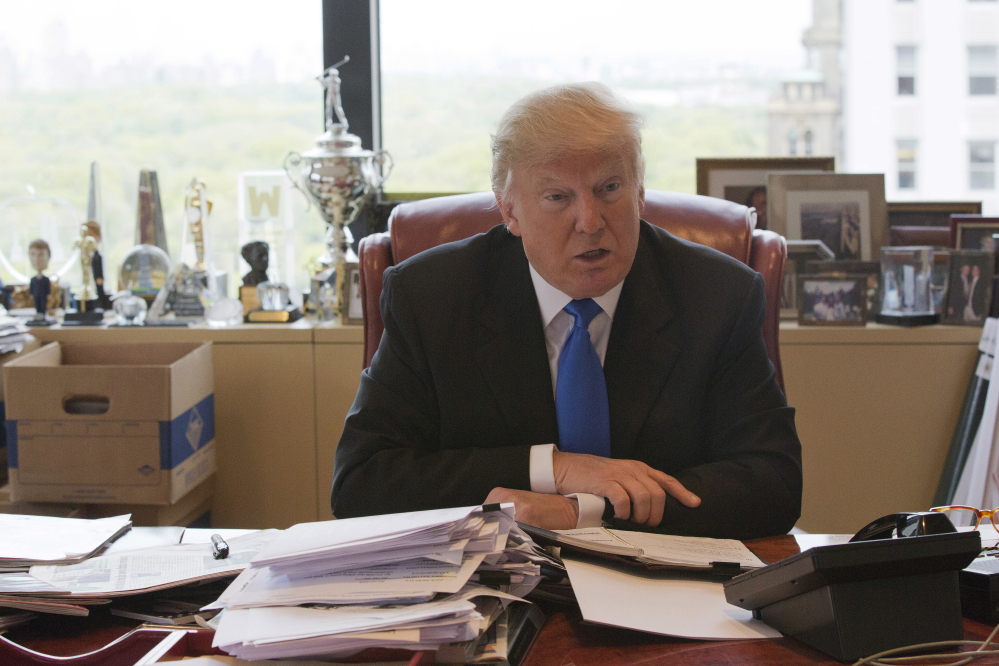NEW YORK — President-elect Donald Trump looked at hundreds of marble samples before selecting one for the lobby of Trump Tower. He can recall, in painstaking detail even decades later, how he stood in the cold and oversaw the ice-making process at Central Park’s rink. And, during the campaign, he personally reviewed every single campaign ad, rejecting some over the smallest of perceived flaws.
The hands-on, minutiae-obsessed management style that Trump has relied on for decades in the business world will now be tested by the presidency, an overwhelming job in which his predecessor says only the most challenging decisions even make it to the Oval Office.
“Somebody noted to me that by the time something reaches my desk, that means it’s really hard,” President Barack Obama has said. “Because if it were easy, somebody else would have made the decision and somebody else would have solved it.”
The president-elect, at times, has been reluctant to delegate. But while his multinational business is indeed vast, the scope of the federal government exceeds any of his previous endeavors.
Those close to him are gently suggesting that he will have to do some more delegating given the sheer volume of decisions needed to get his administration up and running, according to a person familiar with private discussions but not authorized to speak about them by name. Trump has chafed at that, but he has signaled willingness to relinquish some personal control.
Over his career, Trump has been highly involved with the decisions he cares deeply about. When building Trump Tower, the Manhattan skyscraper he calls home, he settled upon a rare marble, Breccia Pernice, for the building’s lobby.
But when he inspected the pieces that had been tagged for use, he found some blemishes – prompting a personal trip to Italy.
“So we ended up going to the quarry with black tape and marking off the slabs that were the best,” Trump wrote in his 1987 book, “The Art of the Deal.” “The rest we just scrapped – maybe 60 percent of the total. By the time we finished, we’d taken the whole top of the mountain and used up much of the quarry.”
At the New York State Republican Dinner in April, Trump stood in front of a group of tuxedo-clad, moneyed, Manhattan peers, confidently pointing out the details in the Grand Hyatt hotel ballroom’s ceiling, remembering how he oversaw the construction process. He then recalled his push to fix Central Park’s Wollman Rink, going into remarkable detail about the contract negotiations, the depth of the concrete, the need to switch from copper piping to rubber hose to keep the ice frozen, and even the conversation he had with the Montreal Canadiens’ head ice-maker to make sure the process went smoothly.
“I hope that’s an interesting story,” Trump told the crowd. “Who the hell wants to talk about politics all the time, right? Politics gets a little boring!”
But Trump almost certainly won’t be able to exert that same of control over his new employees: The federal workforce is more than 2 million people.
Obama frequently cites an observation by his first defense secretary, Robert Gates: “One thing you should know, Mr. President, is that any given moment, on any given day, somebody in the federal government is screwing up.” While Obama praises federal workers, he adds: “Even if you’re firing at a 99.9 percent success rate, that still leaves a lot of opportunity for things not to go as planned.”
Other aspects of Trump’s management style may also not easily translate to the White House. His inner circle is famously small, consisting of longtime allies and his grown children, and his first key West Wing hires – chief of staff Reince Priebus and chief strategist Stephen Bannon – bring no policy experience to their new roles.
Trump works long hours and expects those around him to do so as well. He can be quiet and disengaged in discussions about subjects with which he is unfamiliar but is prone to flash his temper and bark at aides. He is also known to go with his gut, is often swayed on positions by the last person he spoke to, and sometimes swoops in late and orders a change in plans, blowing up a travel schedule or policy rollout.
Aides also often float suggestions to him through the media, knowing that Trump is a voracious watcher of cable TV and might be persuaded by what he sees and hears.
Trump, whose TV catchphrase was “You’re fired,” is prone to pitting staffers against each other in both the business world and during his insurgent campaign. Over the summer, he hired Paul Manafort to prepare for the GOP’s convention and watched as staffers loyal to his campaign manager, Corey Lewandowski, repeatedly clashed with Manafort’s allies. Lewandowski lost the power struggle and was fired. Later, Manafort was dismissed, too, replaced by Bannon and Kellyanne Conway.
Trump, in his 2004 book “How to Get Rich,” described his intense, loyalty-driven style. “I rely on a few key people to keep me informed,” he wrote.
Send questions/comments to the editors.


